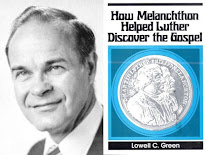Prof. C. Schmidt says in his Melanchthon that in the Cologne Reformation it was said of the Lord's Supper that it is "the communion of the body and blood of our Lord Jesus Christ, in which communion we are to keep His memorial, that we may abide and live more fully in Him by faith, and He in us; and because this giving and receiving of the body and blood of Christ our Lord is a heavenly work and commerce of faith, men ought to cast out all carnal thoughts in this mystery.” Schmidt himself adds:
“The essential presence had been passed over and the enjoyment of body and blood was presented as a matter of faith; obviously this had to displease Luther to the highest degree.” (p. 437 [sic: 427])
It is true that Luther, despite this discovery, must still have thought the best of Melanchthon and considered (LuW 367) Bucer alone to be the culprit, since as late as March 5, 1545, in his preface to the first Tomus [volume] of his Latin writings, he judges Melanchthon in terms of the highest esteem (cf. Tom. Hal. XIV, 427. f.; 453 [StL 14, 438]); *)
——————
*) Melanchthon had also advised against admitting the Swiss into the Smalcald League in March, and advised against allowing the sale of their books in Saxony! (C. R. V., 723. 741)
but soon thereafter, perhaps made aware by Amsdorf, it seemed undeniable to Luther that Melanchthon here, as the collaborator of that draft of the [Cologne] Reformation, had betrayed his erring faith. So Luther decided, however, to finally write publicly against Melanchthon. With great shock this came to the ears of the Elector, and he now sent a written instruction to his chancellor Brück how he should negotiate with Luther so that the open break, where possible, might still be averted. In this instruction of April 26, 1545, it says among other things
“Consider it good, therefore, that you, as for yourselves or by our command, as you will judge such to be the best and the least dangerous, would make the following announcement to Dr. Martin, since it would be done by our order, after reporting our gracious greeting and transferring the enclosed document of our credentials. We would be told credibly, as if he were now working on writing a book against the sacramentarians,**) which we put up with quite well, we would also graciously and gladly see it. But besides that, it also seems to us as if he should want to name Master Philip Melanchthon in such a book because of some stated suspicion, which, if this were the case, would truly be a great concern to us. …
——————
**) This is first of all a writing against Bullinger, who had published an extremely vehement response to Luther's “Brief Confession” [StL 20, 1764 ff.] at the beginning of this year, which even Calvin and Melanchthon disapproved of.
438: “By the grace of God there are now many well-prepared books available, among which the Loci Communes of Philip stand out”; 442: “Philipp Melanchthon was called here by Prince Frederick to teach the Greek sciences, no doubt so that I would have a helper in the work of theology. For what the Lord has wrought through this instrument not only in the sciences but also in theology, his works sufficiently testify.”
“[Johann von] Staupitz used to comfort me with these words and said to me: "Dear, why do you bother yourself with these speculations and high thoughts; look at the wounds of Christ, and his blood, which he shed for you, and from it the salvation will shine forth. Therefore hear the Son of God, who was sent into the flesh, became man, and for this reason appeared to destroy the works of the devil, 1 John 3:8, and to make you sure of salvation.”



No comments:
Post a Comment
Comments only accepted when directly related to the post.